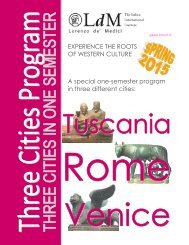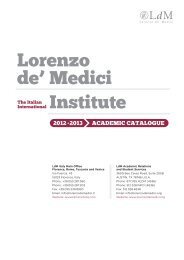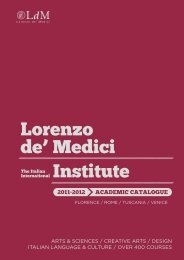aCademiC Catalog 2013-2014 - Lorenzo de Medici
aCademiC Catalog 2013-2014 - Lorenzo de Medici
aCademiC Catalog 2013-2014 - Lorenzo de Medici
Create successful ePaper yourself
Turn your PDF publications into a flip-book with our unique Google optimized e-Paper software.
FLORENCE<br />
School of Arts & Sciences<br />
Prerequisites: PHR 210 World Religions, or POL 288 International<br />
Politics, or equivalents<br />
International Law<br />
POL 315 F<br />
Cr: 3; Contact hrs: 45<br />
International relationships are characterized by a reciprocal<br />
respect for rules, the strict observation of which is consi<strong>de</strong>red<br />
mandatory by nation states. These rules are usually known<br />
as International Law. International society is ma<strong>de</strong> up of<br />
in<strong>de</strong>pen<strong>de</strong>nt entities who are free to make their own choices.<br />
However, they are also, of necessity, inter<strong>de</strong>pen<strong>de</strong>nt and thus<br />
there is a need to establish regularized relationships through the<br />
creation of mutually agreed rules and regulations. In this course<br />
stu<strong>de</strong>nts will learn the rules that nation states use to regulate<br />
their international relationships, and thus they will come to<br />
un<strong>de</strong>rstand how states conduct their foreign policy and what<br />
rules they must respect in their international relationships. The<br />
main topics un<strong>de</strong>r discussion will be: subjects of International<br />
Law; international organizations (with especial emphasis upon<br />
the United Nations), international treaties; international liability<br />
and international crimes (for example, terrorism).<br />
Prerequisites: POL 150 Introduction to Political Science, or<br />
equivalent<br />
The Italian Political System<br />
POL 325 F<br />
Cr: 3; Contact hrs: 45<br />
The course will examine the genesis and the functioning of<br />
the Italian political system. First the course will analyze the<br />
crisis of the liberal state which opened the way to the fascist<br />
dictatorship that lasted for 20 years and en<strong>de</strong>d only with the<br />
disastrous participation in the Second World War on the si<strong>de</strong><br />
of Hitler and Nazi Germany. Then the important contribution of<br />
the Resistenza to the liberation of the country and to the birth<br />
of a new <strong>de</strong>mocratic consciousness will be taken into account,<br />
together with the common participation of the different<br />
political traditions (Liberal, Catholic, Communist) in the writing<br />
of the Constitution. We will then focus on the political parties,<br />
the institutional structure (central and local) and the role of the<br />
interest groups (the Catholic Church, the Unions, Mafia). The<br />
course will conclu<strong>de</strong> by examining the recent transition from<br />
the “First” to the “Second Republic”: the <strong>de</strong>ep crisis of the old<br />
political parties and their collapse through a judicial revolution,<br />
and the emergence of new players on the political field together<br />
with the controversial attempts to reform the system.<br />
Prerequisites: POL 236 Mo<strong>de</strong>rn European Politics, or equivalent<br />
Government and Business<br />
POL 333 F; Dual listed: BUS 333 F<br />
Cr: 3; Contact hrs: 45<br />
This course introduces stu<strong>de</strong>nts to one of the most important<br />
relationships in mo<strong>de</strong>rn societies, that between business and<br />
government. It examines what each si<strong>de</strong> hopes to achieve,<br />
exploring questions that are both empirical (observable<br />
situation) and normative (legislative limits). Corporations<br />
and governments are among the most powerful actors in our<br />
societies; most resources are allocated through markets, firms,<br />
or states. Managing this relationship is one of the greatest<br />
challenges facing today’s policy makers because ina<strong>de</strong>quate<br />
controls on business may lead to social ills such as pollution,<br />
unsafe working conditions, fraud, and financial instability,<br />
yet excessive or inappropriate controls on business may lead<br />
to reductions in competitiveness, investment, employment,<br />
and economic growth. In the first part of the course we will<br />
characterize the interrelationship of <strong>de</strong>mocratic government,<br />
politics and business in both the US and Europe. We will also<br />
examine corporate activities in the political arena including<br />
the impact of corporations on the policy-making process. The<br />
second part of the course centres on accountability at the<br />
national and international levels. We will investigate a series<br />
of key issues concerning the evolving relationship between<br />
business and government in the global economy, such as the<br />
nature of multinational corporations, the particular problems<br />
of <strong>de</strong>veloping countries, and the potential contribution of<br />
international civil society to business regulation and global<br />
governance. Stu<strong>de</strong>nts will consi<strong>de</strong>r the theme of globalization,<br />
and the challenges posed by corporations to <strong>de</strong>mocracy and<br />
to state sovereignty. In this course we will consi<strong>de</strong>r some of<br />
the most crucial issues facing government and business today<br />
— including whether economic globalization threatens national<br />
sovereignty; the place of public opinion, unions, and other<br />
advocacy groups in government/business relations; and the<br />
best way to improve the accountability of multinationals.<br />
Prerequisites: Majors in Political Science or Business<br />
Peacekeeping<br />
POL 360 F; Dual listed: PST 360 F<br />
Cr: 3; Contact hrs: 45<br />
The course focuses on a critical issue in international politics<br />
and global security today: local conflicts around the world.<br />
The course is divi<strong>de</strong>d into three parts, addressing intra-state<br />
conflict, external response, and the politics and strategies<br />
of implementation. The first part applies the theoretical<br />
framework of conflict analysis to recent examples. Special<br />
consi<strong>de</strong>ration is given to un<strong>de</strong>rlying geo-political, economic<br />
and religious divi<strong>de</strong>s. The second part starts with the basic<br />
principles and implications of humanitarian intervention, as well<br />
as collective security, self-<strong>de</strong>termination, national sovereignty<br />
and self-<strong>de</strong>fense. The course next addresses various possible<br />
responses to intra-state conflicts, ranging from third-party<br />
mediation to coercive measures, post-conflict management<br />
and transitional policies. Stu<strong>de</strong>nts <strong>de</strong>al with the following<br />
issues: a) the “peace-enforcement dilemma” (affecting<br />
peacekeeping operations, humanitarian relief, security, human<br />
rights and law and or<strong>de</strong>r enforcement); b) state-building<br />
processes in highly divi<strong>de</strong>d post-conflict societies (involving<br />
i<strong>de</strong>ntity and citizenship, perceptions by different communities,<br />
party behavior, institutional and political accommodation). The<br />
final part focuses on implementation with particular reference<br />
to the following crucial issues: a) cooperation and competition<br />
between international players at all levels; b) the negative<br />
impact of inter- and intra-organizational disagreement on<br />
the whole process; c) monitoring and evaluation. Throughout<br />
the course stu<strong>de</strong>nts analyze specific recent and current case<br />
studies (e.g. Somalia, Bosnia, East Timor, Kosovo, Sudan),<br />
involving the UN, NATO, and numerous NGOs.<br />
Prerequisites: PST 190 Anthropology of Violence and Conflict,<br />
or PST 302 Peace Education, or equivalents<br />
Psychology<br />
Introduction to Psychology<br />
PSY 150 F<br />
Cr: 3; Contact hrs: 45<br />
This course introduces stu<strong>de</strong>nts to the major areas of psychology<br />
through current empirical research and theoretical <strong>de</strong>bate.<br />
Scientific and non-scientific approaches to the explanation<br />
of psychological phenomena are examined critically. Topics<br />
inclu<strong>de</strong>: anthropological assumptions and implications,<br />
<strong>de</strong>ontology, sensation and perception, cognitive processes,<br />
consciousness, language, learning, personality, <strong>de</strong>velopment<br />
and psychopathology. Stu<strong>de</strong>nts will be introduced to the main<br />
theories for each of these topics from different perspectives<br />
(e.g. biological, behavioral, cognitive, and psychodynamic).<br />
Stu<strong>de</strong>nts will also look at the different types of scientific<br />
research (e.g. experiments, correlational research, review, metaanalysis),<br />
and will analyze the typical structure of a research<br />
paper (introduction, method, results, discussion, limitations and<br />
implications).<br />
Social Psychology<br />
PSY 200 F<br />
Cr: 3; Contact hrs: 45<br />
This course is about the study of human social behavior,<br />
examining theories, findings and methods of social psychology,<br />
viewed from an interpersonal perspective. What is the essential<br />
nature of our personality, and what impact do social groups<br />
(whether that group is the family, school, or society) have on<br />
our <strong>de</strong>velopment and everyday behavior? Topics inclu<strong>de</strong>: social<br />
cognition, the role of others in shaping self-concepts, as well<br />
as the formation of person perception, attitu<strong>de</strong>s, attribution<br />
theory, obedience, conformity, interpersonal attraction, and<br />
social relations. We will look at the causes and methods<br />
of reducing prejudice and aggression, as well as exploring<br />
80<br />
LdM Aca<strong>de</strong>mic <strong>Catalog</strong> <strong>2013</strong>-<strong>2014</strong>





